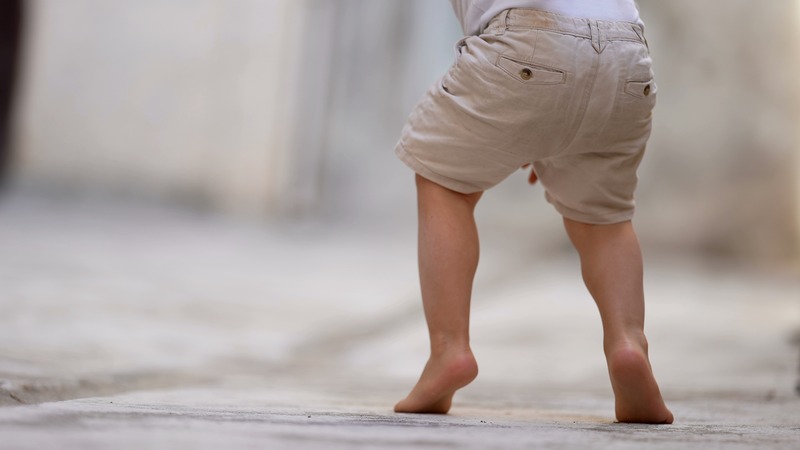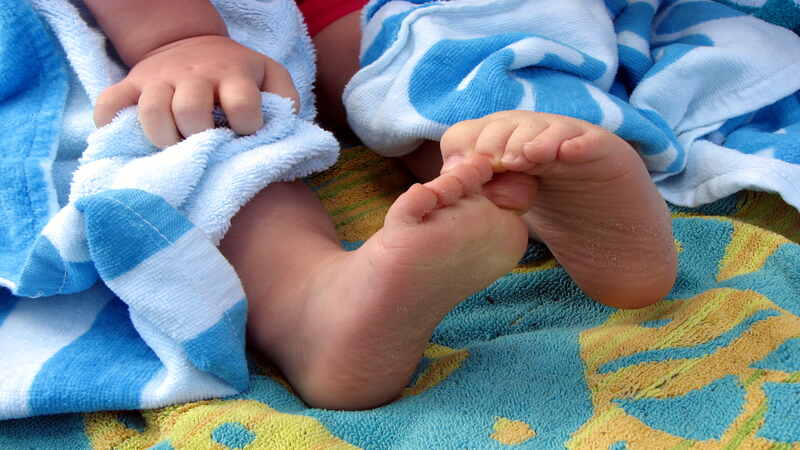
It is always a priceless moment for parents when their tiny tots take their first step. Eventually, your little babies will become toddlers, learning to walk, run, and explore the world. Walking properly requires a lot of skills, like balance and coordination. They are busy throughout the day doing activities like moving from standing to sitting and vice versa. This helps in strengthening their growing muscles.
As kids learn to master the art of walking, you may have noticed them tiptoeing occasionally. Toe walking in toddlers is a pretty common habit, and they eventually outgrow this phase. Persistence of toe walking beyond a certain age calls for certain neurological as well as motor assessments. Read along more to find out more about certain other reasons for toe walking.
What is Toe Walking?

Toe walking is a pattern of walking mostly seen in toddlers, where they walk on their toes or the balls of their feet instead of the normal heel-to-toe stride. In this type of walking, there is no contact between the heels and the ground. It is quite commonly seen in kids who begin walking. Most toddlers outgrow it by the age of two years. Persistence of toe walking beyond toddlerhood might indicate a medical or neurological condition. The prevalence of toe walking in normally developing kids at age 5.5 years is 2%. In toddlers with developmental delays and other neurological issues, it is around 41% (1).
Causes of Toe Walking in Toddlers

Most of the time, toddlers continue to walk on their toes out of habit that develops when they learn to walk. This by itself should not be a concern if your little one is developing normally otherwise. But sometimes, toe walking can be a sign of certain conditions like-
1. Short Achilles Tendon
The Achilles tendon is the tendon that connects the muscles in the back of the calf to the heel bone. It can be a little short in a few toddlers, preventing the heel from touching the ground properly.
2. Muscular Dystrophy
Muscular dystrophy is a disorder causing progressive weakening and loss of muscle mass. It is a genetic disorder and can result in toe walking. Although, the diagnosis usually occurs before the toddler starts to walk (2).
3. Cerebral Palsy
Cerebral palsy is a neurological condition affecting the posture and ability to move. So an abnormal development of a part of the brain can affect the muscle tone resulting in toe walking (3).
4. Autism
Autism is a developmental disorder causing difficulty in communicating or interacting with others. Many times, toe walking is seen in toddlers with autism spectrum disorders. Most of the time toe walking in autism is sensory related as toddlers with autism have a dysfunctional vestibular system that takes care of motion and spatial orientation. In addition to it, many autistic kids avoid contact with ground as much as possible due to contact refusal (4).
5. A Spinal Cord Abnormality
Sometimes a few conditions of the spinal cord like spina bifida or tethered cord syndrome can cause nerve damage leading to toe walking (5).
However, many times the reason for toe walking is unknown.
Symptoms of Toe Walking in Toddlers

The most noticeable symptom is when your toddler walks on the ball of their feet or in their toes. There are a few other symptoms that should not be missed. They are-
- Frequent falls
- Issues in maintaining balance and coordination
- Altered gait due to improper contact of heels to the ground
- Difficulty in wearing shoes
- Difficulty in participating in sports activities
- Pain or discomfort in the foot
- Difficulty in heel walking
- Tightness around the ankles and in the calf muscles
How is Toe Walking Diagnosed?

Diagnosing toe walking in toddlers depends mostly upon the clinical history and thorough physical examination. Your toddler’s healthcare provider will assess the gait or pattern of walking of your little one. An EMG or electromyography is a test for measuring electrical activity in the nerves and muscles. A thorough assessment of a toddler’s legs and feet is essential for the diagnosis. All joints of the lower limbs are assessed to look for any limitations in the range of motion.
A general neurological examination is also essential to rule out any problems with the nervous system, possibly, cerebral palsy or autism. This assessment is carried out to check for your toddler’s reflexes along with testing the muscle strength. A test is also done to check for sensations in the feet and legs.
Treatment Options For Toe Walking

Most of the toddlers outgrow toe walking. So mostly it is a wait and watch situation with frequent health checkups. But, if this condition persists or a diagnosis has been made of any physical reason causing toe walking, then treatment becomes necessary. If there is any issue with the muscles or tendons of the legs, then the treatment includes-
- Physical Therapy This includes various exercises to strengthen the weak muscles of the legs. Gentle stretching of the feet is also done to help with gait improvement.
- Splints or Leg Braces This helps in the correction of the gait. Leg braces are worn by the kid, and they help keep the foot at a 90-degree angle. This helps in stretching and lengthening the tendons and calf muscles when they walk throughout the day.
- Casting This helps in proper alignment of the toes to the shin with the use of below-the-knee casts.
- Botulinum Toxin A Injection They allow stretching of the calf muscles to promote normal walking (6).
- Surgery This is the last resort, if all the other conservative methods fail. It is necessary if there are any issues with the Achilles tendon or the calf muscles. It is considered the most effective treatment of idiopathic toe walkers (7).
Understanding and knowing the causes and symptoms of toe walking in toddlers can be really helpful for early detection. This will ensure an early intervention and can be life changing for your little one. By addressing this condition earlier and with the help of a good support team, you can give your toddler a better quality of life.
FAQ’s
1. Is it Normal For a Toddler to Walk on Tiptoes?
It is quite common for toddlers to walk on their tiptoes until the age of two years. Toddlers do this when they are beginning to walk, and they eventually outgrow this condition. Most of them do it out of habit but persistence of toe walking for 4-5 years requires medical attention.
2. Is Tiptoe Walking a Sign of ADHD or Autism?
Yes, toe walking can be one of the signs of autism or ADHD. Many researches show that toe walking is very common in kids with autism spectrum disorder. Although not all kids with autism exhibit toe walking and not all kids who do tiptoe walking are autistic.
3. When Should I Worry About Toe Walking?
If your toddler is still walking on tiptoes beyond the age of two years, then it can signal a medical condition. You need to get your kid thoroughly examined for any issues with the tendons or muscles of the legs or any neurological issue.
4. Is Toe Walking Abnormal?
No, most of the time, toe walking is absolutely normal when toddlers begin to start walking. A lot of kids eventually outgrow toe walking, but if it persists, then it indicates an abnormality and might require medical attention.
References
- Ruzbarsky JJ, Scher D, Dodwell E. Toe walking: causes, epidemiology, assessment, and treatment. Curr Opin Pediatr. 2016 Feb;28(1):40-6. doi: 10.1097/MOP.0000000000000302. PMID: 26709689. – https://pubmed.ncbi.nlm.nih.gov/26709689/
- Sadjadpour K. Duchenne Muscular Dystrophy. JAMA. 1975;234(4):382. doi:10.1001/jama.1975.03260170018010 – https://jamanetwork.com/journals/jama/article-abstract/341607
- Lisa H. Shulman, Debra A. Sala, Mary Lynn Y. Chu, Patricia R. McCaul, Bonnie J. Sandler,
Developmental implications of idiopathic toe walking, The Journal of Pediatrics, Volume 130, Issue 4, 1997, Pages 541-546, ISSN 0022-3476, https://doi.org/10.1016/S0022-3476(97)70236-1. – https://www.sciencedirect.com/science/article/pii/S0022347697702361 - Manfredi F, Riefoli F, Coviello M, Dibello D. The Management of Toe Walking in Children with Autism Spectrum Disorder: “Cast and Go”. Children (Basel). 2022 Sep 27;9(10):1477. doi: 10.3390/children9101477. PMID: 36291413; PMCID: PMC9600566. – https://www.ncbi.nlm.nih.gov/pmc/articles/PMC9600566/
- Holmes, Gregory L., and Peter M. Bingham, ‘Walking on Tiptoes’, Pediatric Neurology, 2 edn, What Do I Do Now (New York, 2016; online edn, Oxford Academic, 1 May 2016), https://doi.org/10.1093/med/9780190601508.003.0027, accessed 11 July 2024. – https://academic.oup.com/book/27923/chapter-abstract/204868447?redirectedFrom=fulltext&login=false
- Engström P, Gutierrez-Farewik EM, Bartonek Å, Tedroff K, Orefelt C, Haglund-Åkerlind Y. Does botulinum toxin A improve the walking pattern in children with idiopathic toe-walking? Journal of Children’s Orthopaedics. 2010;4(4):301-308. – https://journals.sagepub.com/doi/full/10.1007/s11832-010-0263-9
- McMulkin ML, Baird GO, Caskey PM, Ferguson RL. Comprehensive outcomes of surgically treated idiopathic toe walkers. J Pediatr Orthop. 2006 Sep-Oct;26(5):606-11. doi: 10.1097/01.bpo.0000230334.80910.0c. PMID: 16932099. – https://pubmed.ncbi.nlm.nih.gov/16932099/
